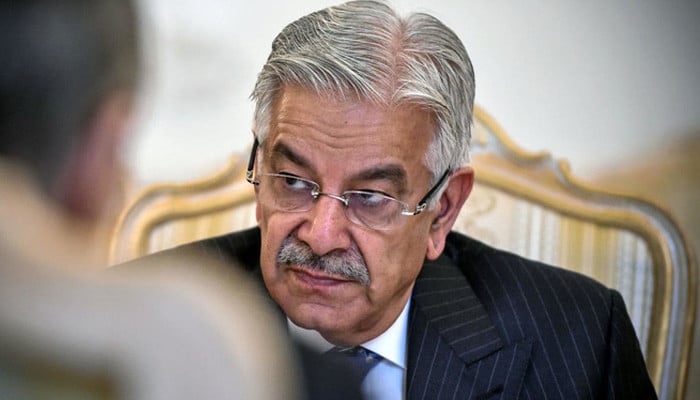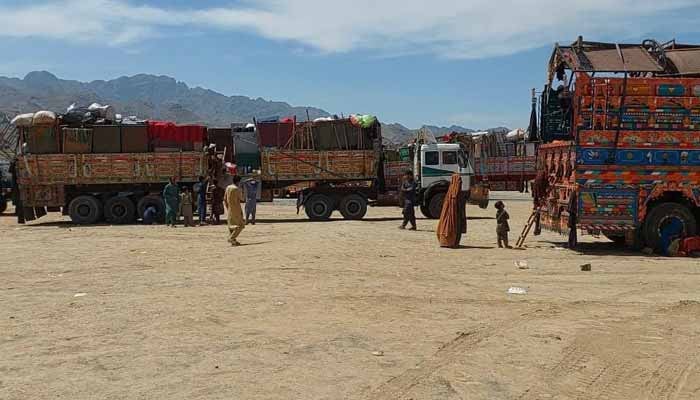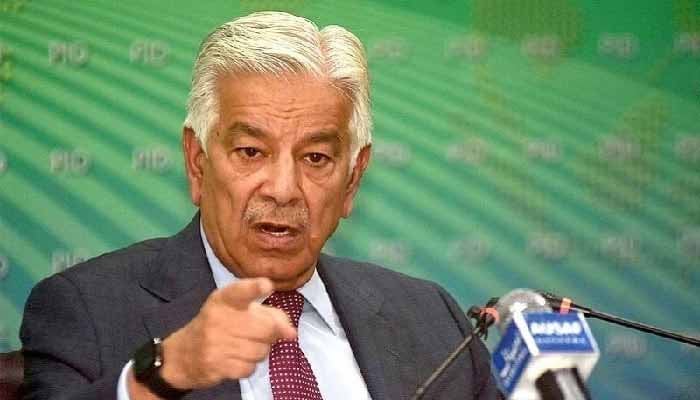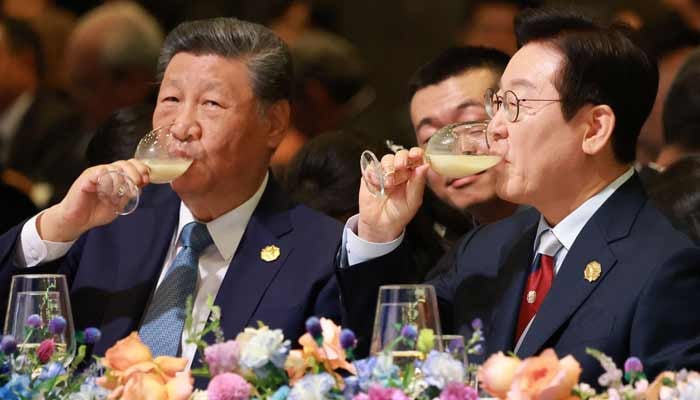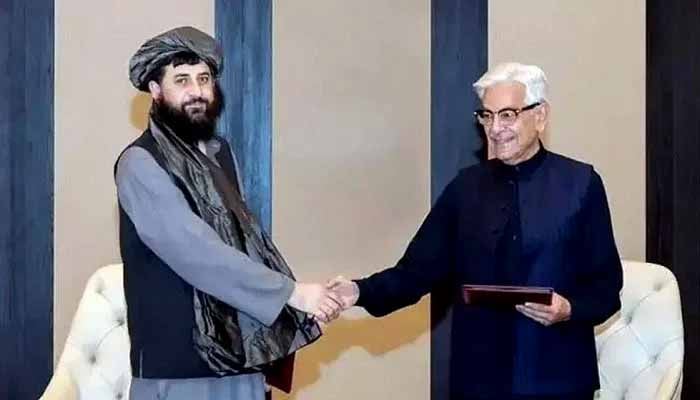
Defence Minister, Khawaja Muhammad Asif (right), shakes hands with his Afghan counterpart Mullah Mohammad Yaqoob Mujahid, following the signing of a ceasefire agreement in Doha, Qatar, October 19, 2025. — Reuters
#Pakistan #decides #resume #peace #talks #Taliban #regime #mediator #Turkiyes #request
ISLAMABAD: Pakistan has agreed to resume talks with the Afghan Taliban government in Istanbul on Turkey’s request for mediation.
Sources familiar with the development told Geo News that Pakistan decided to restart the dialogue process to give peace another chance. The Pakistani delegation, which was preparing to return home after earlier talks broke down, will now extend its stay in Istanbul to continue discussions.
The talks will reportedly focus on Pakistan’s main demand that Afghanistan take “clear, verifiable and effective action” against terrorist groups operating from its territory, the sources added.
Despite mediation efforts by friendly countries, talks between Pakistan and Afghanistan in Istanbul ended after the Taliban government refused to provide affirmative guarantees that their territory would not be used by groups like the TTP to launch attacks against Pakistan.
Islamabad has repeatedly conveyed its concerns to Taliban rulers about cross-border attacks and has stressed that Afghan territory should not be used for terrorism against Pakistan.
Information and Broadcasting Minister Attaullah Tarar confirmed early Wednesday morning that four days of talks with the Afghan Taliban in Istanbul had ended without progress, despite Pakistan’s repeated demands for counter-terrorism backed by evidence.
“The dialogue thus failed to produce any workable solution,” Tarar said in an X-post. He added that Pakistan has long sought cooperation from Kabul against militants targeting the country.
He also thanked Qatar, Turkey and other friendly countries for their support and sincere efforts to bring about a peaceful solution to the problem of terrorism.
Meanwhile, Defense Minister Khawaja Muhammad Asif has said in an interview to Geo News that ongoing talks with the Taliban government in Istanbul have not produced a breakthrough yet. He warned that progress so far did not justify inflated expectations.
Asif said Qatar and Turkey had acted as mediators, with Qatar’s defense minister and Turkish intelligence chief working to ensure dialogue and prevent any obstruction.
“Our delegation arrived at the airport last night to return, but Qatar and Turkey asked us to give the talks another chance. Efforts were on to engage the Kabul delegation and find a viable way forward,” he added.
The defense minister stressed that progress would depend on Kabul under the guidance of these friendly countries. “It would be a major step if they stopped supporting terrorists,” he said.
Asif asserted that peace is the basis of any outcome. “Without this, no forward movement will be possible. If India-backed terrorism or TTP support continues, nothing can be achieved,” he warned.
Asif concluded, “If Kabul wants to play a positive role, we welcome it. But if they continue to obstruct or act as a proxy for India, nothing can be done. Any attempt to destabilize Pakistan’s peace will meet decisively.”
Deep strike warning to Taliban
A day earlier, Defense Minister Khawaja Asif had warned that Pakistan would conduct airstrikes really deep inside Afghanistan if terrorists use its territory against Pakistan.
In a post on X, Asif said Pakistan was engaged in talks at the request of brotherly countries in an effort to give peace a chance, but the “poisonous rhetoric” of some Afghan officials clearly reflected the deviant and expansionist mindset of the Taliban government.
The defense czar posted on X, “We have put up with your treachery and taunts for too long, but no one else. A terrorist attack or suicide bombing inside Pakistan will give you a bitter taste of such malpractices. If you wish, at your own peril and doom, reassure and test our resolve and capabilities.”
Asif added: “I assure them that Pakistan need not use even a fraction of its total arsenal to completely eliminate the Taliban regime and push them back into the caves to hide. If they wish, a repeat of the Tora Bora scenes with their tails between their legs will certainly be a spectacle for the people of the region.”
The defense minister further alleged that the Taliban government has been accused of blindly pushing Afghanistan into another conflict, only to maintain its watchdog rule and the war economy that sustains them.
Meanwhile, in an interview with Al Arabiya English’s web TV show “Counterpoints”, Khawaja Asif has said that New Delhi is waging a “low intensity war” against Islamabad from Afghan soil.
Islamabad-Kabul tension
Since the Afghan Taliban government assumed power in 2021, Pakistan has been witnessing an increase in incidents of terrorism, particularly in KP and Balochistan.
The government has repeatedly urged the Taliban government to rein in the terrorist groups responsible for countless attacks in Pakistan.
However, the Taliban regime remained largely indifferent to Pakistan’s demands and provided sanctuary to several terrorist groups targeting security forces and civilians.
Instead of addressing Pakistan’s concerns about cross-border terrorism, the Taliban government resorted to unprovoked firing along the border on 12 October.
The Pakistan Armed Forces quickly retaliated, killing more than 200 Taliban fighters and associated militants. However, as many as 23 Pakistani soldiers were martyred during the border clashes.
Security forces also carried out strikes inside Afghanistan, including in Kabul, which destroyed terrorist hideouts in the country.
Pakistan ended hostilities between the two countries’ forces on October 17 after accepting the Taliban government’s request for a temporary ceasefire.
Delegations from the two countries later met in Doha for talks mediated by Qatar, where they agreed to a ceasefire agreement.
Turkey then hosted the second round of talks in Istanbul, which began on October 25.
However, the talks ended inconclusively after four days over what Pakistani officials described as “illogical” arguments by the Taliban delegation, which they said were “disconnected from the realities on the ground”.
